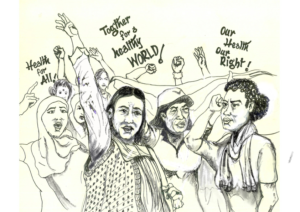As the election process unfolds in India, right-to-health networks are urging that more attention be given to healthcare. During the presentation of the People’s Health Manifesto on March 23, Jan Swasthya Abhiyan (JSA), the regional arm of the People’s Health Movement, put forth a list of recommendations for political parties participating in the election. These points aim to achieve universal access to healthcare in the country.
JSA highlighted 18 key points for candidates to consider, which include a common system to provide health services to all citizens, developing mechanisms to safeguard workers’ health, halting the commercialization of medical education, ensuring that health facilities remain spaces of secularism and inclusion, and removing all barriers to accessing healthcare.
A prominent point of the JSA Manifesto is the emphasis on health expenditure and the responsibility to ensure everyone’s right to health. India’s public health spending is among the lowest globally, with only 0.37% of the union government’s budget allocated to healthcare in 2020-2021. Despite the lessons from the COVID-19 pandemic, which highlighted the need for increased health investment, further cuts to the central health budget have been announced. In 2024-2025, health expenditure is expected to amount to only 0.29% of the budget, reducing the scope and quality of care available to the public.
Health activists and experts within JSA advocate for increasing this percentage to at least 1% of the union government budget — in addition to bringing overall public health expenditure to at least 3,5% GDP — and for providing State governments with greater autonomy through devolution and dedicated budget envelopes to strengthen health services. The importance of supporting public healthcare funding is underscored by the large amount of out-of-pocket payments made by patients and their families. Speakers at the manifesto launch warned that over half of health expenditure comes directly from patients.
Meanwhile, private healthcare companies and their owners are profiting significantly from the sector. In 2022, the health sector produced the highest number of billionaires in India – 32. Electoral bonds have become the most heated and debated topic during this election season. Pharmaceutical and healthcare companies have also vied for political influence. They have purchased electoral bonds worth over 9 million INR (approximately 120,000 USD), indicating their interest to expand influence beyond the health sector.
JSA called for better regulation of the private sector to reduce its ability to exploit public resources. This includes regulating its scope and discontinuing programs that allow private providers to benefit from public budgets with minimal or no advantage to public health.
One such program is the government-funded health insurance scheme, Pradhan Mantri Jan Arogya Yojana (PMJAY), which, according to gathered data, has not fulfilled its promise of health for all. Only 3 out of 100 people can access free care under the current health insurance models, and only when they seek treatment in public facilities. At the same time, the quality of care delivery varies tremendously between the private and public sector: those who can afford to go to private hospitals avail of higher standards of care, while the public sector struggles to maintain such standard when delivering care to the poor. Those in power should respect their responsibility to provide good quality health for all, in this case through a process of standardization and the building of a common system that everyone can rely upon.
Indranil from JSA stated, “Healthcare is fundamentally the responsibility of the government. We call for the phase-out of government-funded health insurance schemes and public-private partnerships. Resources should be redirected towards strengthening public healthcare systems and ensuring universal access to quality care.”

The accessibility of care is impacted not only by financial barriers but also by a widespread shortage of health workers across various positions. This has led to significant understaffing in community and primary health centers, with 35% of rural doctor positions vacant and an almost 80% shortage of gynecologists in community health centers, severely affecting women’s health. Every year, 145 women die in childbirth in India, while only 58% of pregnant women receive a minimum of 4 antenatal check-ups by a health visitor.
Yet, over 900,000 ASHA workers in India receive less than the minimum wage despite their crucial role in healthcare provision. Many health and care workers are employed on a contractual basis, leading to job insecurity and greater potential for workers’ rights abuses. Sarojini N. from JSA emphasized, “The government should regularize ASHA, ANM, and Anganwadi workers and provide them with proper wages.”
Access to medicines represents another barrier for people, exacerbated by high costs. Efforts to weaken the Patent Law and the introduction of new Free Trade Agreements risk causing increases in medicine prices, threatening access to essential drugs for patients with diseases like tuberculosis, despite India having one of the highest TB burdens globally.
People are also facing barriers in accessing medicines due to high costs. Attempts to dilute provisions of the Patent Law and the introduction of new Free Trade Agreements have increased the risk of medicines’ price oscillations, endangering access to key products for patients living with diseases such as tuberculosis, despite the fact that India still represents around a quarter of the global TB burden.
Harishankar Singh of the Delhi Network of Positive People (DNP+) said: “Access to affordable and quality essential drugs and diagnostics is non-negotiable. Implementing effective price control measures, returning to cost-based pricing, and ensuring availability of medicines as per the NLEM 2022 are critical steps towards achieving equitable healthcare for all.”
As they approach the election, all parties and policy-makers should consider JSA’s recommendations as a path to guaranteeing the right to health for everyone, according to JSA’s national co-convener Richa Chintan. “Our Health Manifesto embodies our collective vision for a healthier and more equitable India.”
People’s Health Dispatch is a fortnightly bulletin published by the People’s Health Movement and Peoples Dispatch. For more articles and to subscribe to People’s Health Dispatch, click here.





